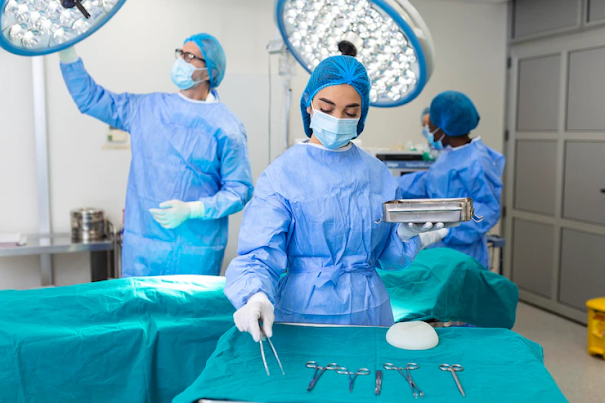Surgical Technician’s Role of Responsibilities
Summary:
In
this blog, we will explore the responsibilities of a surgical technician and
how they contribute to successful patient outcomes. We will also discuss the
various career paths available to those interested in pursuing a career as a
surgical technician.
A surgical technician is a
healthcare professional who plays an important role in assisting surgeons
during operations. These medical professionals provide support for the entire
team of healthcare providers and ensure that surgery is conducted safely and
efficiently. To become a surgical technician, one must complete an accredited
program and obtain specialized training and certification.
What is a surgical technician?
A surgical technician is a medical
professional who works alongside surgeons and other members of the surgical
team to ensure that operations are carried out safely and effectively. Surgical
technicians are responsible for preparing operating rooms and instruments, as
well as assisting surgeons during procedures.
Surgical
technicians typically
have an Associate's degree in surgical technology, although some may have
completed formal training programs offered by hospitals or vocational schools.
Many surgical technicians go on to become certified by the National Board of
Surgical Technology and Surgical Assisting (NBSTSA).
The duties of a surgical technician
A medical staffing, also called a scrub or operating room technician,
is an allied health professional who works with surgeons, anaesthetists, and
other operating theatre staff during surgery. Surgical technicians are
responsible for preparing the operating room and equipment for surgery and
assisting the surgeon during the procedure.
After completing postsecondary
education in surgical technology, surgical technicians must pass a
certification exam before they can begin working. In some states, surgical
technicians may also need to be licensed. Once they are certified and/or
licensed, surgical technicians typically find employment in hospitals or
ambulatory surgery centers.
The duties of a surgical technician vary depending on the specific type of surgery being performed. However, there are some general duties that all surgical technicians perform.
These duties include:
-Preparing the operating room for
surgery by sterilizing equipment and setting up instruments and supplies
-Assisting the surgeon during the
procedure by handing them instruments and supplies as needed
-Counting sponges, needles, and
other items used during surgery to ensure that none are left inside the
patient's body
-Applying dressings to incisions
after surgery is completed
-Monitoring patients' vital signs
during surgery
The educational requirements for becoming a surgical technician
There are a few educational requirements for becoming a surgical technician, such as completing an accredited program and passing a certification exam.
Surgicalfirst assists must
complete an accredited program to be eligible for certification. Programs
typically last between 9 months to 2 years, and include both classroom and
clinical instruction. After completing an accredited program, surgical
technicians must pass the Certified Surgical Technician (CST) exam administered
by the National Board of Surgical Technology and Surgical Assisting (NBSTSA).
Upon passing the CST exam, surgical technicians are credentialed and can begin
working in the operating room.
Some employers may require
surgical technicians to have completed a certain number of continuing education
units (CEUs) in order to maintain their credentialing and employment status.
CEUs can be earned through taking courses or attending seminars related to
surgical technology or other medical topics.
What are the working conditions for surgical technicians?
Working conditions for surgical
technicians can vary depending on the type of facility they work in. Generally,
they work in well-lit, clean operating rooms with controlled temperature and
ventilation. They may be required to stand for long periods of time and wear
protective clothing, such as masks and gowns.
Surgical technicians typically
work full time, and their schedules may include evenings, weekends, and
holidays. They may be on call, which means they may have to work at odd hours
with little or no notice. Overtime is common in this occupation.
What is the job outlook for surgical technicians?
The job outlook for surgical
technicians is positive. The employment of surgical technicians will grow by 12
percent from 2018 to 2028, faster than the average for all occupations. An aging
population and advances in medical technology will fuel demand for surgical
procedures, resulting in more opportunities for surgical technicians.
Conclusion
In conclusion, surgical
technicians are a key part of operating rooms and provide an essential service
to ensure the safety of patients. They have a wide range of roles and
responsibilities that can vary depending on their experience level and the type
of facility they work in. Their ability to quickly adapt to changing conditions
is invaluable as they help make sure surgeries run smoothly. With proper
training and certifications, becoming a surgical technician may be the perfect
career path for you if you're looking for a rewarding job in healthcare!




Comments
Post a Comment